Unit 2 I'll help to clean up the city parks.Section A 3a-4c课件(共有PPT24张)
文档属性
| 名称 | Unit 2 I'll help to clean up the city parks.Section A 3a-4c课件(共有PPT24张) |
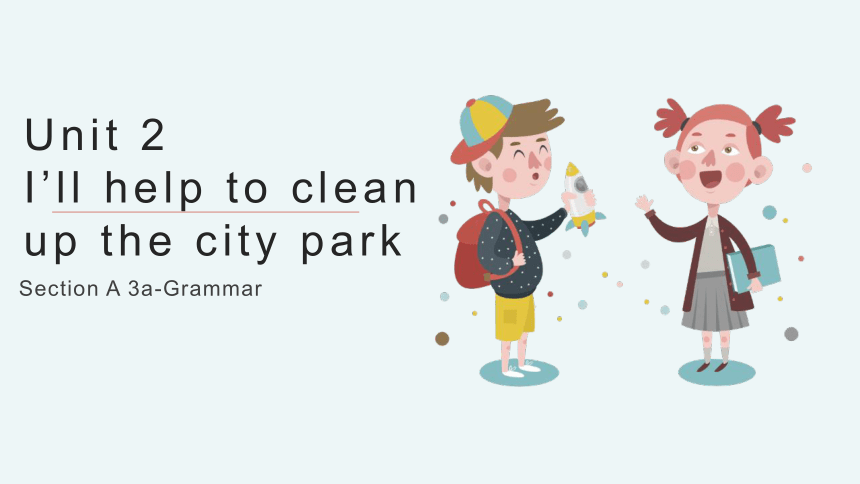
|
|
| 格式 | pptx | ||
| 文件大小 | 1.7MB | ||
| 资源类型 | 教案 | ||
| 版本资源 | 人教新目标(Go for it)版 | ||
| 科目 | 英语 | ||
| 更新时间 | 2022-02-24 20:45:23 | ||
图片预览

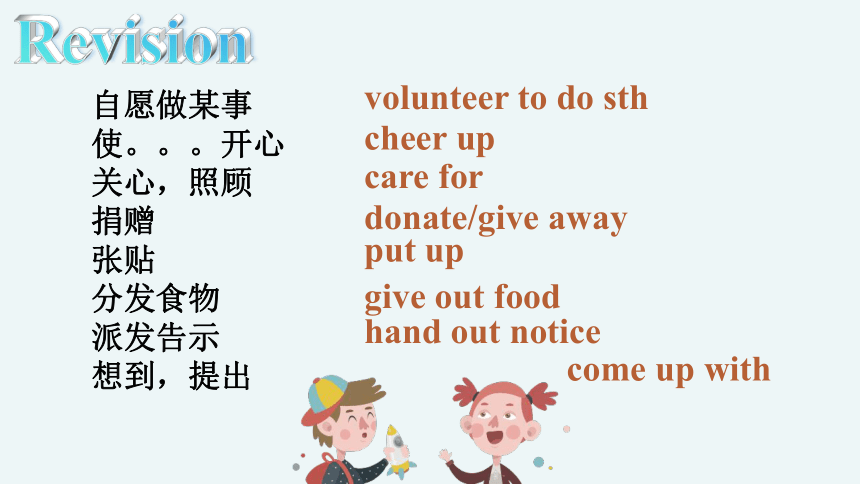
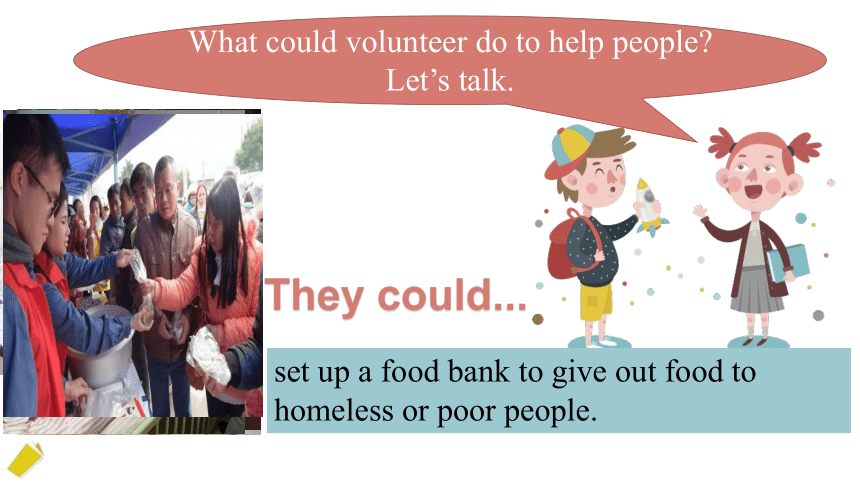
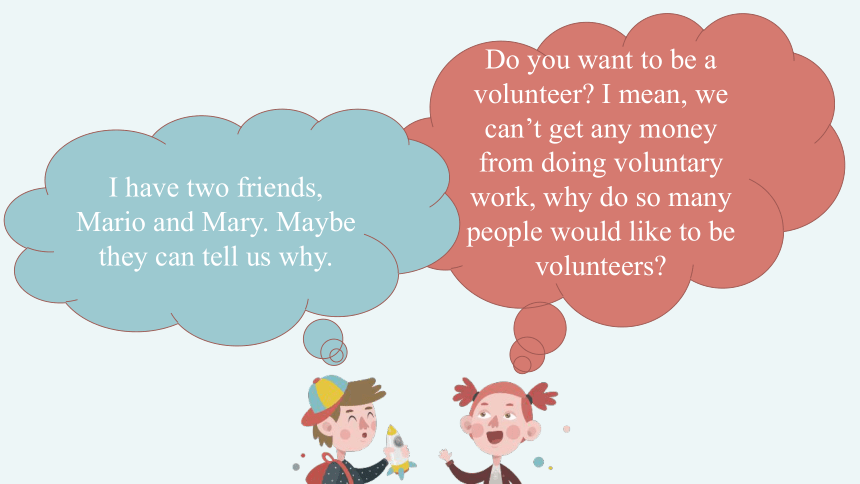

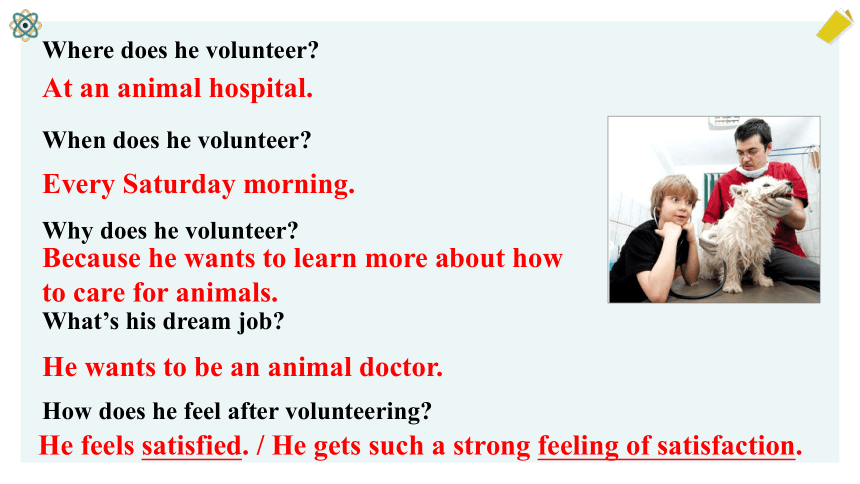
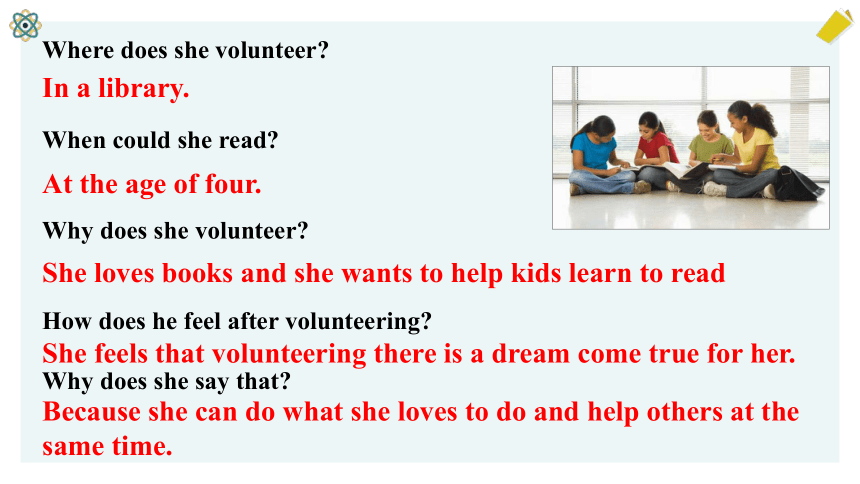
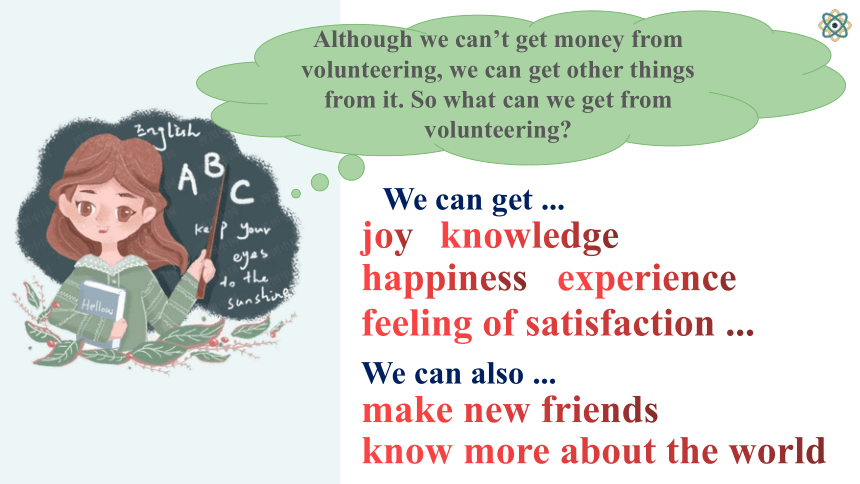
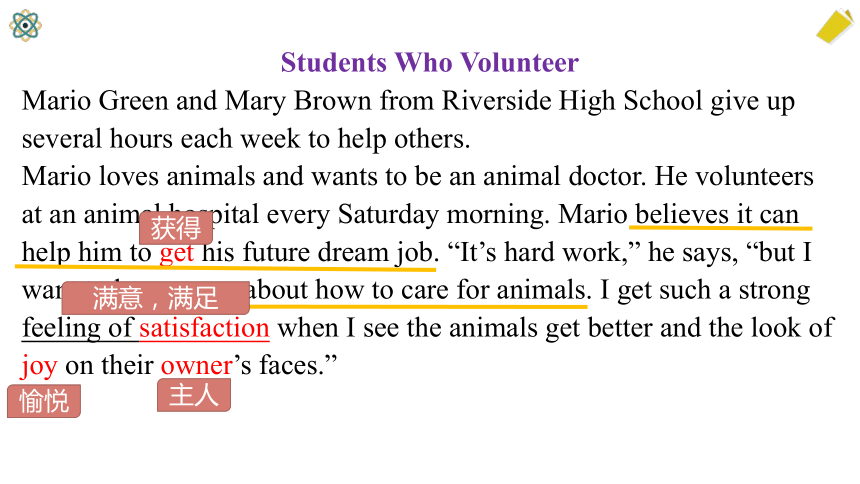
文档简介
(共24张PPT)
Unit 2
I’ll help to clean up the city park
Section A 3a-Grammar
Revision
自愿做某事
使。。。开心
关心,照顾
捐赠
张贴
分发食物
派发告示
想到,提出
volunteer to do sth
cheer up
care for
donate/give away
put up
give out food
hand out notice
come up with
What could volunteer do to help people
Let’s talk.
They could...
help to clean up the city parks, such as sweeping the floor and picking up rubbish.
help to raise money or clothes for poor people.
visit old people and help them with chores.
visit sick children in hospital and cheer them up.
set up a food bank to give out food to homeless or poor people.
Do you want to be a volunteer I mean, we can’t get any money from doing voluntary work, why do so many people would like to be volunteers
I have two friends, Mario and Mary. Maybe they can tell us why.
I am Mario Green, a student from Riverside High School.
I am Mary Brown, a student from Riverside High School, too.
Please read our stories and you’ll know why we volunteer to help others.
Where does he volunteer
When does he volunteer
Why does he volunteer
What’s his dream job
How does he feel after volunteering
At an animal hospital.
Every Saturday morning.
Because he wants to learn more about how to care for animals.
He wants to be an animal doctor.
He feels satisfied. / He gets such a strong feeling of satisfaction.
Where does she volunteer
When could she read
Why does she volunteer
How does he feel after volunteering
Why does she say that
In a library.
At the age of four.
She loves books and she wants to help kids learn to read
She feels that volunteering there is a dream come true for her.
Because she can do what she loves to do and help others at the same time.
Although we can’t get money from volunteering, we can get other things from it. So what can we get from volunteering
We can get ...
joy
knowledge
happiness
experience
make new friends
We can also ...
know more about the world
feeling of satisfaction ...
Students Who Volunteer
Mario Green and Mary Brown from Riverside High School give up several hours each week to help others.
Mario loves animals and wants to be an animal doctor. He volunteers at an animal hospital every Saturday morning. Mario believes it can help him to get his future dream job. “It’s hard work,” he says, “but I want to learn more about how to care for animals. I get such a strong feeling of satisfaction when I see the animals get better and the look of joy on their owner’s faces.”
获得
满意,满足
愉悦
主人
Mary is a book lover. She could read by herself at the age of four. Last year, she decided to try out for a volunteer after-school reading program. She still works there once a week to help kids learn to read. “The kids are sitting in the library, but you can see in their eyes that they’re going on a different journey with each new book. Volunteering here is a dream come true for me. I can do what I love to do and help others at the same time.”
=when she was four(在几岁时)
参加。。。选拔
学习做
旅行
同时
Use infinitives to complete the sentences below.
1. Mario would like ______ an animal doctor.
2. Mario works for an animal hospital because he wants ________ about how ________ for animals.
3. Mary decided __________ for a job at an after-school reading program last year. She still works there now ____________ kids learn to read.
4. Mary has a dream job because she can do what she loves _______.
to be
to learn
to care
to try out
to help
to do
Infinitives动词不定式
He likes to read novels.
I saw him come.
We decided not to buy that house.
4) It is interesting to fly a kite.
5) Please let him not go there.
肯定: to + V.原 或者 (to)+ V.原
否定:not/never + (to) + V.原
Infinitives动词不定式的用法
1. To study hard is very important.
2. She plans to go and teach in the country.
3. The doctor told me to have a good rest.
4. His work is to clean the classroom every day.
5. I have a lot of work to do.
6. I’m sorry to hear that.
7. The soldier ran into the room to save the girl .
8. You are too young to do this job.
(作主语,位于句首)
(作宾语,位于动词后)
It is important to study hard.
(作宾补)
(作表语)
(作定语,修饰前面的名词)
(作原因状语)
(作目的状语)
(作结果状语)
作主语
To hear your voice is so nice.
To study hard is very important.
It is so nice to hear your voice.
It is very important to study hard.
不定式作主语时,通常用it作形式主语,
把真正的主语放在后面。
注意:
1、It is +adj. for/ of sb. to do sth.
It +be + adj. +for/of sb. to do sth.
for: adj.多为描述不定式行为的特征 (important/ necessary / interesting 等.)
of: adj. 多为 描述主语的品质特征 (kind / nice / friendly / wise / foolish 等.)
作主语
It is easy _______ her to learn English well.
It is clever ________ you to solve the problem.
of
for
It takes sb. some time to do sth.
It is + n. (for sb) to do sth.
作主语
It takes me three hours to finish the homework every day.
It is my pleasure(荣幸) to help you with your English.
作宾语时的特殊用法
动词+疑问词+to do
1、我不知道接下来该做什么。
I don’t know____________ next.
She can’t decide_________________.
2、她不能决定买哪本书。
what to do
which book to buy
All I did was to give him some advice .
His dream is to travel all over the world.
Lucy needs a friend to play with .
He was the last guest to arrive .
It’s interesting to read a science fiction .
下列不定式作何种成分?
(表语)
(表语)
(定语)
(定语)
(主语)
He was glad to see you.
My father offered to buy a computer for me.
He interviewed detective Ken to get some information .
The doctor asked him to have more fruit and vegetables.
(状语)
(宾语)
(状语)
(宾语补足语)
下列不定式作何种成分?
固定句型:
had better/had best + (not) do sth. 最好(不)做某事
Why (not) do sth. 为什么不。。。?
…prefer to do/prefer doing 更喜欢做。。。
…prefer + n./doing A +to + n./doing B 比起B,更喜欢A
…prefer + to do A rather than (to) do B
比起B,更喜欢做A
…would rather (not) do sth. 宁愿做。。。
…would rather do A than (do) B 比起B,更喜欢做A
Fill in the blanks with the phrasal verbs in the box.
put up
hand out
call up
cheer up
come up with give out put off
1. I want to ______ my plan to work in an animal hospital
until next summer. I’m too busy with my studies this year.
2. She hopes to ______ at least five primary schools to ask if
they need volunteers for their after-school programs.
3. Our class is trying to ____________ some ideas to
_______ sick children because they are often sad.
4. We decided to ______ signs around the school and
________ notices to tell students about the book sale. We
will _______ the money from the sale to homeless people.
put off
call up
come up with
cheer up
put up
hand out
give out
Fill in the blanks with the correct forms of the verbs in the box.
help move do make visit spend
Most people today are only worried about getting good jobs 1.________ lots of money. In their free time, they think about what 2. _______ for fun. However, few people think about what they can do 3. _______ others. There are many people who are less lucky than us. Volunteering our time to help these people is a good way 4. ________ our free time. For example, we can make plans 5.______ sick children in the hospital or raise money for homeless people. Some people even stop doing their jobs for a few months to a year 6. _______ to another place, like one of the countries in Africa, and help people there.
to make
to do
to help
to spend
to visit
to move
Complete the sentences with your own ideas. Use infinitives.
1. I’d like to volunteer ______________________________________
2. At 12: a.m., I called my friend ______________________________
3. I’m very busy but I could help ______________________________
4. Summer vacation is coming, and I want __________________________
5. I want to travel alone. My parents told me (not) ___________________
to help kids with their homework
to play soccer together in the afternoon.
take the trash out after dinner.
to go camping with my friends.
not to do that.
Thanks
Unit 2
I’ll help to clean up the city park
Section A 3a-Grammar
Revision
自愿做某事
使。。。开心
关心,照顾
捐赠
张贴
分发食物
派发告示
想到,提出
volunteer to do sth
cheer up
care for
donate/give away
put up
give out food
hand out notice
come up with
What could volunteer do to help people
Let’s talk.
They could...
help to clean up the city parks, such as sweeping the floor and picking up rubbish.
help to raise money or clothes for poor people.
visit old people and help them with chores.
visit sick children in hospital and cheer them up.
set up a food bank to give out food to homeless or poor people.
Do you want to be a volunteer I mean, we can’t get any money from doing voluntary work, why do so many people would like to be volunteers
I have two friends, Mario and Mary. Maybe they can tell us why.
I am Mario Green, a student from Riverside High School.
I am Mary Brown, a student from Riverside High School, too.
Please read our stories and you’ll know why we volunteer to help others.
Where does he volunteer
When does he volunteer
Why does he volunteer
What’s his dream job
How does he feel after volunteering
At an animal hospital.
Every Saturday morning.
Because he wants to learn more about how to care for animals.
He wants to be an animal doctor.
He feels satisfied. / He gets such a strong feeling of satisfaction.
Where does she volunteer
When could she read
Why does she volunteer
How does he feel after volunteering
Why does she say that
In a library.
At the age of four.
She loves books and she wants to help kids learn to read
She feels that volunteering there is a dream come true for her.
Because she can do what she loves to do and help others at the same time.
Although we can’t get money from volunteering, we can get other things from it. So what can we get from volunteering
We can get ...
joy
knowledge
happiness
experience
make new friends
We can also ...
know more about the world
feeling of satisfaction ...
Students Who Volunteer
Mario Green and Mary Brown from Riverside High School give up several hours each week to help others.
Mario loves animals and wants to be an animal doctor. He volunteers at an animal hospital every Saturday morning. Mario believes it can help him to get his future dream job. “It’s hard work,” he says, “but I want to learn more about how to care for animals. I get such a strong feeling of satisfaction when I see the animals get better and the look of joy on their owner’s faces.”
获得
满意,满足
愉悦
主人
Mary is a book lover. She could read by herself at the age of four. Last year, she decided to try out for a volunteer after-school reading program. She still works there once a week to help kids learn to read. “The kids are sitting in the library, but you can see in their eyes that they’re going on a different journey with each new book. Volunteering here is a dream come true for me. I can do what I love to do and help others at the same time.”
=when she was four(在几岁时)
参加。。。选拔
学习做
旅行
同时
Use infinitives to complete the sentences below.
1. Mario would like ______ an animal doctor.
2. Mario works for an animal hospital because he wants ________ about how ________ for animals.
3. Mary decided __________ for a job at an after-school reading program last year. She still works there now ____________ kids learn to read.
4. Mary has a dream job because she can do what she loves _______.
to be
to learn
to care
to try out
to help
to do
Infinitives动词不定式
He likes to read novels.
I saw him come.
We decided not to buy that house.
4) It is interesting to fly a kite.
5) Please let him not go there.
肯定: to + V.原 或者 (to)+ V.原
否定:not/never + (to) + V.原
Infinitives动词不定式的用法
1. To study hard is very important.
2. She plans to go and teach in the country.
3. The doctor told me to have a good rest.
4. His work is to clean the classroom every day.
5. I have a lot of work to do.
6. I’m sorry to hear that.
7. The soldier ran into the room to save the girl .
8. You are too young to do this job.
(作主语,位于句首)
(作宾语,位于动词后)
It is important to study hard.
(作宾补)
(作表语)
(作定语,修饰前面的名词)
(作原因状语)
(作目的状语)
(作结果状语)
作主语
To hear your voice is so nice.
To study hard is very important.
It is so nice to hear your voice.
It is very important to study hard.
不定式作主语时,通常用it作形式主语,
把真正的主语放在后面。
注意:
1、It is +adj. for/ of sb. to do sth.
It +be + adj. +for/of sb. to do sth.
for: adj.多为描述不定式行为的特征 (important/ necessary / interesting 等.)
of: adj. 多为 描述主语的品质特征 (kind / nice / friendly / wise / foolish 等.)
作主语
It is easy _______ her to learn English well.
It is clever ________ you to solve the problem.
of
for
It takes sb. some time to do sth.
It is + n. (for sb) to do sth.
作主语
It takes me three hours to finish the homework every day.
It is my pleasure(荣幸) to help you with your English.
作宾语时的特殊用法
动词+疑问词+to do
1、我不知道接下来该做什么。
I don’t know____________ next.
She can’t decide_________________.
2、她不能决定买哪本书。
what to do
which book to buy
All I did was to give him some advice .
His dream is to travel all over the world.
Lucy needs a friend to play with .
He was the last guest to arrive .
It’s interesting to read a science fiction .
下列不定式作何种成分?
(表语)
(表语)
(定语)
(定语)
(主语)
He was glad to see you.
My father offered to buy a computer for me.
He interviewed detective Ken to get some information .
The doctor asked him to have more fruit and vegetables.
(状语)
(宾语)
(状语)
(宾语补足语)
下列不定式作何种成分?
固定句型:
had better/had best + (not) do sth. 最好(不)做某事
Why (not) do sth. 为什么不。。。?
…prefer to do/prefer doing 更喜欢做。。。
…prefer + n./doing A +to + n./doing B 比起B,更喜欢A
…prefer + to do A rather than (to) do B
比起B,更喜欢做A
…would rather (not) do sth. 宁愿做。。。
…would rather do A than (do) B 比起B,更喜欢做A
Fill in the blanks with the phrasal verbs in the box.
put up
hand out
call up
cheer up
come up with give out put off
1. I want to ______ my plan to work in an animal hospital
until next summer. I’m too busy with my studies this year.
2. She hopes to ______ at least five primary schools to ask if
they need volunteers for their after-school programs.
3. Our class is trying to ____________ some ideas to
_______ sick children because they are often sad.
4. We decided to ______ signs around the school and
________ notices to tell students about the book sale. We
will _______ the money from the sale to homeless people.
put off
call up
come up with
cheer up
put up
hand out
give out
Fill in the blanks with the correct forms of the verbs in the box.
help move do make visit spend
Most people today are only worried about getting good jobs 1.________ lots of money. In their free time, they think about what 2. _______ for fun. However, few people think about what they can do 3. _______ others. There are many people who are less lucky than us. Volunteering our time to help these people is a good way 4. ________ our free time. For example, we can make plans 5.______ sick children in the hospital or raise money for homeless people. Some people even stop doing their jobs for a few months to a year 6. _______ to another place, like one of the countries in Africa, and help people there.
to make
to do
to help
to spend
to visit
to move
Complete the sentences with your own ideas. Use infinitives.
1. I’d like to volunteer ______________________________________
2. At 12: a.m., I called my friend ______________________________
3. I’m very busy but I could help ______________________________
4. Summer vacation is coming, and I want __________________________
5. I want to travel alone. My parents told me (not) ___________________
to help kids with their homework
to play soccer together in the afternoon.
take the trash out after dinner.
to go camping with my friends.
not to do that.
Thanks
同课章节目录
- Unit 1 What's the matter?
- Section A
- Section B
- Unit 2 I'll help to clean up the city parks.
- Section A
- Section B
- Unit 3 Could you please clean your room?
- Section A
- Section B
- Unit 4 Why don't you talk to your parents?
- Section A
- Section B
- Unit 5 What were you doing when the rainstorm came
- Section A
- Section B
- Review of Units 1-5
- Unit 6 An old man tried to move the mountains.
- Section A
- Section B
- Unit 7 What's the highest mountain in the world?
- Section A
- Section B
- Unit 8 Have you read Treasure Island yet?
- Section A
- Section B
- Unit 9 Have you ever been to a museum?
- Section A
- Section B
- Unit 10 I've had this bike for three years.
- Section A
- Section B
